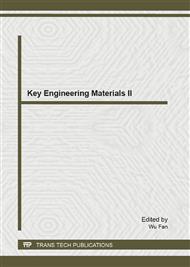[1]
J. Kennedy, R. C. Eberhart. Particle Swarm Optimization. IEEE International Conference on Neural Networks, Perth, Australia, 1995, IV: 1942-1948.
Google Scholar
[2]
R.C. Eberhart, Y.H. Shi. Particle Swarm optimization: development, applications and resource. IEEE International Conference on evolutionary Computation, Seoul, Korea, 2001:81-86.
Google Scholar
[3]
J. Kennedy. Probability and Dynamics in the Particle Swarm. IEEE International Conference on Evolutionary Computation, 2004:340-347.
Google Scholar
[4]
X.D. Li, A.P. Engelbrecht. Particle swarm optimization: An introduction and its recent developments. IEEE International Conference on Genetic evolutionary Computation,2007,3391-3414.
DOI: 10.1145/1274000.1274118
Google Scholar
[5]
Y.H. Shi, R. C. Eberhart. Fuzzy adaptive particle swarm optimization. IEEE International Conference on Evolutionary Computation, 2001: 101-106.
DOI: 10.1109/cec.2001.934377
Google Scholar
[6]
S.Y. Ho, H.S. Lin, W.H. Liauh, S. J. Ho. OPSO: Orthogonal particle swarm optimization and its application to task assignment problems. IEEE International conference on systems, man and cybernetics, 2008, 38(2):288-298.
DOI: 10.1109/tsmca.2007.914796
Google Scholar
[7]
F.Van den Bergh, A.P. Engelbrecht. A new locally convergent particle swarm optimizer. IEEE International conference on systems, man and cybernetics, 2002:96-101.
DOI: 10.1109/icsmc.2002.1176018
Google Scholar
[8]
X.F. Xie, W.J. Zhang, Z.L. Yang. Overview of particle swarm optimization. Control and Decision, 2003,18 (2):129-134.
Google Scholar
[9]
Y.H. Shi, R. C. Eberhart. A Modified Particle Swarm optimizer. IEEE International Conference on Evolutionary Computation, 1998: 1945-1950.
DOI: 10.1109/icec.1998.699146
Google Scholar
[10]
M. Clere, J. Kennedy. The particle swarm: explosion, stability and convergence in a multi-dimensional complex space. IEEE Transactions on Evolution Computation, 2002,6(1):58-73.
DOI: 10.1109/4235.985692
Google Scholar
[11]
F.Van den Bergh, A.P. Engelbrecht. A study of particle optimization particle trajectories. Information Scineces, 2006, 179(8):937-971.
Google Scholar
[12]
F.Van den Bergh. An Analysis of Particle Swarm Optimizers. University of Pretoria, Nov 2001.
Google Scholar
[13]
J.Sun,W. B. Xu. Adaptive Parameter Control for Quantum-behaved Particle Swarm Optimization on individual level. Proceedings of the congress on Systems, Man and Cybernetics,2005: 3049-3054.
DOI: 10.1109/icsmc.2005.1571614
Google Scholar


